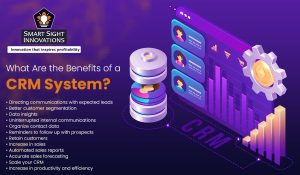 Summary – If you are looking to improve customer relations, a CRM must be a part of your business strategy. The main goal of any CRM is to ensure maximum sales by optimizing business processes, improving the quality of goods and services, and communicating effectively with customers with streamlined after-sales service and technical support. It is the CRM that captures and analyzes leads, stores information about customers and accepts complaints from these customers. Based on this information, it provides you with data, which allows data-backed decision-making. This data is a great way to improve the quality of service and thereby increase sales. Engaging with a leading CRM system development services company would benefit your operations.
Summary – If you are looking to improve customer relations, a CRM must be a part of your business strategy. The main goal of any CRM is to ensure maximum sales by optimizing business processes, improving the quality of goods and services, and communicating effectively with customers with streamlined after-sales service and technical support. It is the CRM that captures and analyzes leads, stores information about customers and accepts complaints from these customers. Based on this information, it provides you with data, which allows data-backed decision-making. This data is a great way to improve the quality of service and thereby increase sales. Engaging with a leading CRM system development services company would benefit your operations.
The benefits provided by CRM software include taking the right steps towards building long-lasting relations with your customers with all the data and metrics available to you in one place. A CRM helps companies target different audiences, set up alerts on individual leads, connect with contacts, ensure accurate reporting, help build dashboards to display important data, automated messaging and provide interactive service, all of which assist efforts to maintain relationships with customers.
Above all, a CRM system used across departments ensures that all customer-related teams have the right data to create an excellent customer experience. Using an expert CRM development company is a step in the right direction for specific benefits such as:
-
Directing communications with expected leads
With many steps to communicate, lead nurturing can be a complex process. A CRM manages this process automatically by sending alerts to your employees. It helps them reach out to the prospect and tracks every conversation from emails to phone calls.
Another advantage here is that you can have a complete overview of the entire customer journey and trace each step of how the customer interacts with your business – whether offline or online. This makes it easy to understand and predict the next step.
-
Better customer segmentation
For businesses that interact with several customers across multiple touchpoints, tracking the sheer number of interactions could be a challenge. For instance, how do you know which customers want to see your message about your new product or service? Here, CRM helps by automatically segmenting your contact lists based on specific criteria that you can define, thus making it easier to find the people you want to contact.
With automation, CRMs allow marketing teams to have a better understanding of the customer and to have more valuable conversations as they interact.
You can use the data within CRM to send emails by segmenting customer preferences, interests, and values into groups and categorize contacts by gender, age, location, etc.
-
Data insights
With the drastic increase in e-commerce transactions, website visits, social media interactions and customer reviews, data has become ubiquitous and is of utmost importance for your business.
But raw data is irrelevant if you can’t access and format it properly. Spreadsheets are heavy with many data points to consider.
CRM systems have analytics and reporting capabilities to help with the management. Visualization via the dashboard for quick summary allows deep insights into any metric you want to track, such as
- Value of the leads
- Click-through rates or CTR
- Sales performance
- Revenue by region
This way you can identify probable bottlenecks before they affect product or service delivery. Also, you can find out where to prioritize sales efforts to achieve maximum ROI and generate reports without manually sifting through large data streams.
This capability is invaluable for your business as it keeps key KPIs in a user-friendly format to give you a complete view of your company’s performance.
-
Uninterrupted internal communications
In addition to facilitating communication between your business and your customers, a CRM can make it easier for your employees to communicate with each other. A CRM makes it easy to see how other employees are talking with a potential customer.
This streamlining helps your team maintain a unified brand voice. It allows team members to send each other notes or alerts, tag each other on projects, and send messages and emails – all within one system.
-
Organize contact data
CRM allows your team to easily keep track of every contact and their related data. This is regardless of the stage of their buyer’s journey. Your sales team will be able to see if a contact visited your company’s website, downloaded content from the site, or already spoke with another member of your sales team.
Plus, your representatives can write notes from their calls or email interactions with contacts and leads. The good part is that this information is always found within the CRM.
-
Reminders to follow up with prospects
With a CRM, it’s possible to track all of your potential activity, which helps your sales team know when to follow up with specific prospects. When sales reps are reminded of specific follow-ups, they can determine their interaction at the time when their support is most helpful to a prospect.
That way, teams can increase the chances of converting more of these leads into loyal customers.
-
Retain customers
The value of customer retention is unparalleled. But how does CRM make a difference? It helps you manage your customer relationships at every stage, which is highly critical for businesses aiming for a steep growth trajectory.
CRM helps customer retention by enabling better service and streamlining processes. Other important functions that a CRM performs include:
- Customer insights: This shows you the likelihood of customers who leave so that you can re-engage them to reduce bounce rates.
- Surveys: To assess customer sentiment and satisfaction.
- Multi-channel support: Provides personalized content when customers are on their mobile, at the store, or surfing the web on a laptop or desktop.
- Loyalty programs: Lets you reward your loyal customers with special offers, discounts and content.
-
Increase in sales
Your sales will continue to grow only when customers keep coming back. CRM helps you build your sales pipeline by streamlining the sales process and automating primary tasks.
It analyzes all your sales data and stores it centrally. Anyone who needs it can access this information anytime. This capability will help your business establish a step-by-step sales process that your employees can customize when needed.
-
Automated sales reports
Using the dashboard and reporting features of CRM software, your team can easily collect and organize data about potential and current customers. It allows your employees to automate and manage their pipelines and processes.
CRM can also help your team members evaluate their performance, track their allocations and goals, and check their progress at a glance on each of their projects.
-
Accurate sales forecasting
You need to review your past performance and make a strategic plan for the future as part of your business strategy. You can identify key trends and get an idea of what to expect in the future sales performance by using automated sales reports in your CRM. You can do this as you adjust your goals and metrics to match the future projections.
-
Scale your CRM
You can expand your CRM capabilities as your company grows to:
- Track more leads
- Better organize contact information
- Record a large number of conversations with prospects
And it’s not just limited to your sales structure – as you grow, your CRM can help other teams, such as customer service, within your organization. Customer service and marketing teams can potentially extract information to:
- Contact prospects
- Personalize content for them
- Tailor CTAs and product descriptions to match their requirements
-
Increase in productivity and efficiency
CRM software uses marketing automation technology that accelerates small tasks like drip campaigns and frees up your employees’ time. They can focus on a task that only humans can do, such as creating content.
It can also ensure that no task is missed by gaps such as sending informative emails to the interested people. Plus, a CRM can create a dashboard for you on how your business processes are working and where your workflows can be improved.
Customer relationship management is the core of a successful business. If you are also selling or providing services to your customers, then stand out from the rest. Building a strong customer reputation on trust, loyalty and value is what matters most.
A CRM is a critical aspect of building a robust customer experience with your business. You can better manage customer relationships by working with dedicated CRM software development services to build customized solutions.













